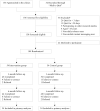Mobile Chat Messaging for Preventing Smoking Relapse Amid the COVID-19 Pandemic: A Pilot Randomized Controlled Trial
- PMID: 35166327
- PMCID: PMC9383464
- DOI: 10.1093/ntr/ntac045
Mobile Chat Messaging for Preventing Smoking Relapse Amid the COVID-19 Pandemic: A Pilot Randomized Controlled Trial
Abstract
Introduction: The ongoing COVID-19 pandemic had reduced access to traditional, in-person smoking cessation treatment. We examined the feasibility, acceptability, and potential effectiveness of mobile chat messaging in preventing smoking relapse in smokers who have recently quit smoking.
Methods: In this assessor-blinded, pilot randomized controlled trial in five cessation clinics, we recruited adult daily smokers who had been receiving cessation treatments and abstained for 3 to 30 days. The intervention group received real-time, personalized chat messaging on relapse prevention via WhatsApp for 3 months. The control group received generic text messaging on the harms of smoking and benefits of quitting for 3 months. The primary outcome was carbon monoxide-validated abstinence at 6 months post-treatment initiation. The trial was registered with ClinicalTrials.gov (NCT04409496).
Results: From June to July 2020, 108 of 130 (83%) eligible subjects were randomized to the intervention (N = 54) or control (N = 54) groups. The retention rate was 93% at 3 months (end of treatment) and 85% at 6 months. In the intervention group, 80% of participants responded to the chat messages at least once; 43% continuously engaged with the intervention over the 3-month intervention period. By intention-to-treat, validated abstinence at 6 months was higher in the intervention than control group (31% vs. 22%), with a relative risk of 1.72 (95% CI = 0.91% to 3.23%; p = .09) after adjusting for pre-quit nicotine dependence, duration of abstinence, and cessation treatment at baseline.
Conclusions: This pilot trial showed the feasibility and acceptability of mobile chat messaging for relapse prevention with preliminary evidence on its effectiveness in increasing validated abstinence.
Implications: Smoking relapse is the most likely outcome of smoking cessation attempts and an undertreated problem. This pilot trial showed the feasibility and acceptability of personalized chat messaging via WhatsApp for relapse prevention in recent abstainers amid the COVID-19 pandemic. The higher carbon monoxide-validated abstinence rate in participants who received chat messaging than controls showed preliminary evidence on the effectiveness of the intervention. Fully powered trials are warranted to test the intervention.
© The Author(s) 2022. Published by Oxford University Press on behalf of the Society for Research on Nicotine and Tobacco. All rights reserved. For permissions, please e-mail: journals.permissions@oup.com.
Figures
References
Publication types
MeSH terms
Substances
Associated data
LinkOut - more resources
Full Text Sources
Medical


